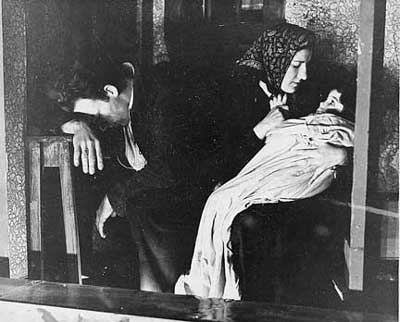 The Living Newspaper One Third of a Nation presented a theatrical picture of the American housing crisis, and was used in Seattle to depict regional slums. (Courtesy of University of Washington Libraries, Special Collections Division.)
The Living Newspaper One Third of a Nation presented a theatrical picture of the American housing crisis, and was used in Seattle to depict regional slums. (Courtesy of University of Washington Libraries, Special Collections Division.)
The Living Newspaper was the brainchild of FTP national director Hallie Flanagan and her mission to create a theatre that could both entertain and instruct.
These plays focused on issues of national social, political, and economic importance, the kind of topics that would feature in the headlines of newspapers. Flanagan created a Living Newspaper staff along the lines of an actual printed daily paper, with an editor-in-chief, managing editors, reporters, copyreaders, etc. and paired this staff of reporters and journalists with dramatists. Together, the Living Newspaper staff would investigate such issues as how and why New York slums developed or the state of utilities (both public and private) in Tennessee, and would gradually distill a “dramatic” piece from the facts.
Though Flanagan insisted that the Federal Theatre Project was not a political tool, inevitably the Living Newspapers became pieces of political theatre, sometimes even propaganda, frequently supporting other New Deal programs or legislation (Power backed the Tennessee Valley Authority, for example, and One-Third of a Nation argued for government housing).
In Seattle, these plays were often altered to suit local tastes and their productions were timed to coincide with local legislation: Power supported Seattle City Light against the private utility Puget Power; the King County Medical Society sponsored Spirochete to raise awareness about the need for syphilis testing; and audiences for One-Third of a Nation faced a lobby presentation of photographs of Seattle slums.
Read illustrated histories of specific Living Newspaper productions, written by Sarah Guthu:
 |
Power (1937)
This production, dramatizing New Deal debates between private and publicly-owned utilities, resonated with Seattle residents who were debating between the private Puget Power Company and the public Seattle City Light. |
 |
One-Third of a Nation (1938)
The Washington Federal Theatre Project's longest-running production advocated for government-sponsored housing. |
 |
Spirochete (1939)
This Living Newspaper presented the history of syphilis and intervened in debates about venereal disease prevention in Seattle. |
